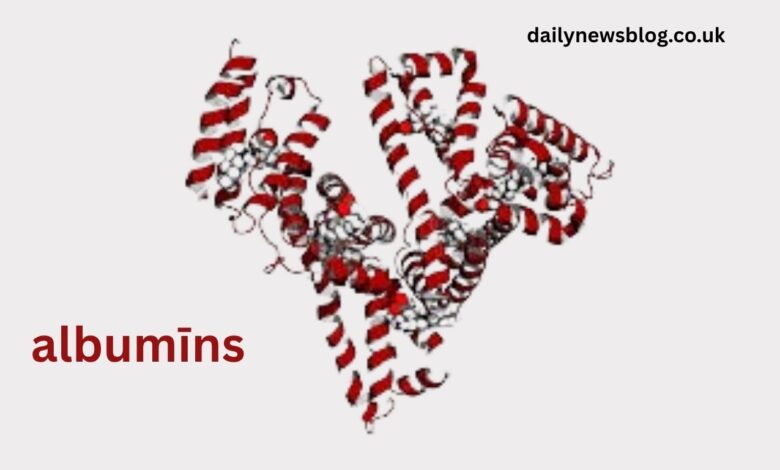Doctors Reveal Why Albumīns Are More Important Than You Think

What Is Albumīns?
Albumīns is a type of protein produced by the liver and is the most abundant protein in human blood plasma. It plays a vital role in maintaining the osmotic pressure needed for the proper distribution of body fluids between blood vessels and body tissues. But its significance doesn’t end there.
In addition to fluid balance, albumīns function as a transport protein. It binds to various molecules, including hormones, vitamins, drugs, and ions like calcium, helping them travel through the bloodstream to the organs and tissues where they are needed. This means albumīns are not only essential for hydration but also for the efficient delivery of essential compounds.
Moreover, albumīns serve as a reserve protein. During times of protein deficiency, illness, or starvation, the body may break down albumīns to meet energy and amino acid needs. This makes it a critical component in survival during physiological stress.
Key Functions of Albumīns
Maintaining Osmotic Pressure
One of the primary functions of albumīns is to regulate colloid osmotic pressure, preventing plasma from leaking into surrounding tissues. Without sufficient albumīns, blood vessels would lose their ability to hold fluid, resulting in swelling (edema) and reduced blood volume.
This function becomes particularly important in critical care. For instance, in burn victims or patients with severe infections like sepsis, albumīns infusions are often used to stabilize fluid levels and support circulation.
Transporting Vital Molecules
Albumīns acts like a biological taxi, binding to various substances to aid their transport. This includes free fatty acids, steroid hormones, bilirubin, thyroid hormones, and even certain medications. The ability to bind and carry drugs makes albumīns critical in pharmacokinetics—the study of how medications move through the body.
When albumīns levels are low, drugs may not be delivered efficiently to target organs, reducing their effectiveness. In clinical settings, doctors often adjust drug dosages based on albumīns concentration to avoid toxicity or under-dosing.
Regulating pH and Detoxification
Albumīns help buffer the blood, keeping its pH stable—a key factor for enzyme function and cellular activities. A drop in blood pH, known as acidosis, can have severe consequences, but albumīns mitigate this risk by neutralizing acids.
Additionally, albumīns binds to waste products and toxins, escorting them to the liver for elimination. This function is especially important in people with kidney or liver disease, where the body struggles to remove waste naturally.
Normal Albumīns Levels
The normal range for albumīns in the blood is typically 3.5 to 5.0 grams per deciliter (g/dL). This value may slightly vary depending on laboratory reference ranges and the individual’s age, sex, and health condition.
Monitoring albumīns levels is often part of comprehensive metabolic panels. Doctors may track it over time to assess nutritional status, liver function, and disease progression. Persistently low levels, even if not causing obvious symptoms, can hint at underlying issues such as chronic inflammation or organ failure.
Pregnant women, athletes, and individuals recovering from surgery may also experience temporary fluctuations in albumīns levels due to physiological demands or shifts in fluid balance.
Causes of Low Albumīns (Hypoalbuminemia)
Liver Disease
Because the liver produces albumīns, any condition impairing liver function, such as hepatitis, cirrhosis, or fatty liver, can lead to reduced production. In advanced cases, this may contribute to ascites, where fluid accumulates in the abdominal cavity.
Kidney Disorders
Kidney diseases, especially nephrotic syndrome, allow proteins like albumīns to leak out of the blood and into the urine. This protein loss weakens the blood’s ability to retain water, resulting in swelling and increased strain on the cardiovascular system.
Malnutrition and Malabsorption
Low intake of protein-rich foods, or inability to absorb nutrients due to diseases like celiac or Crohn’s disease, leads to reduced albumīns production. This is common in elderly patients and those undergoing chemotherapy or with chronic gastrointestinal issues.
Inflammatory and Chronic Diseases
Chronic illnesses such as cancer, tuberculosis, lupus, or HIV/AIDS place high metabolic demands on the body. Inflammatory cytokines also suppress liver production of albumīns, further contributing to hypoalbuminemia in these patients.
Severe Burns or Trauma
Patients who have suffered extensive burns or trauma often lose albumīns through damaged skin or in the inflammatory response that follows injury. In such cases, albumin therapy is used to restore balance and promote healing.
Causes of High Albumīns (Hyperalbuminemia)Dehydration
When the body loses fluids due to fever, vomiting, diarrhea, or poor intake, the blood becomes more concentrated. This artificially inflates albumīns levels in blood tests. Rehydration usually returns these levels to normal.
Certain Medications
Medications like corticosteroids or diuretics may cause albumīns levels to rise temporarily. These changes are usually harmless but should be monitored in patients with pre-existing health conditions.
Lab Errors or Rare Conditions
In rare instances, elevated albumīns levels may result from laboratory inaccuracies or rare genetic disorders. Confirmatory tests are essential before making clinical decisions based solely on high albumīns results.
Symptoms of Abnormal Albumīns Levels
Low albumīns levels may present with:
- Swelling in the legs, feet, and face
- Fatigue or general weakness
- Slow wound healing
- Reduced immunity or frequent infections
- Poor appetite and unintended weight loss
High albumīns levels, though rare, may cause symptoms related to dehydration, such as:
- Dry mouth and skin
- Dizziness or low blood pressure
- Muscle cramps
- Mental fog due to reduced blood volume
How to Maintain Healthy Albumīns Levels
Consume a Protein-Rich Diet
A well-balanced diet with ample protein is vital. Include lean meats, fish, dairy, eggs, legumes, and nuts. For those who follow plant-based diets, tofu, tempeh, quinoa, and chickpeas are excellent choices to support albumīns production.
Stay Hydrated
Hydration supports overall blood health and helps maintain the fluid balance that albumīns regulate. Consistent water intake supports organ function and prevents artificial elevation in albumīns readings.
Manage Chronic Conditions
Diseases like diabetes and hypertension can compromise kidney and liver function, leading to abnormal albumīns levels. Regular monitoring and treatment of these conditions can help maintain a healthy protein balance.
Get Regular Checkups
Routine blood tests can track changes in albumīns, alerting doctors to possible nutritional deficiencies or early signs of disease. Early detection can make a significant difference in managing health outcomes.
When to Get Your Albumīns Tested
Doctors often recommend testing albumīns as part of liver panels or during evaluations for symptoms like swelling, fatigue, or unexpected weight changes. It’s especially important for:
- Elderly individuals
- Hospitalized or critically ill patients
- People with chronic illnesses (diabetes, cancer, heart failure)
- Pregnant women with signs of preeclampsia
- Individuals with symptoms of kidney or liver dysfunction
FAQs About Albumīns
1. What does a low albumīns level mean?
It could indicate liver damage, kidney issues, malnutrition, or inflammation.
2. Can I raise my albumīns level naturally?
Yes, through proper diet, hydration, and managing underlying health problems.
3. Are high albumīns levels dangerous?
Generally not, and they often result from dehydration. Persistent elevation may need further evaluation.
4. Why do doctors monitor albumīns during treatment?
Because it influences drug effectiveness and reflects the body’s protein reserves and healing potential.
5. Is albumīns used in hospital treatments?
Yes, especially in cases of trauma, burns, liver disease, and critical illness, where fluid balance is key.
Conclusion
Albumīns is far more than just a blood protein—it’s a silent guardian of your body’s fluid balance, nutrient transport, and detoxification systems. Often overlooked in routine discussions about health, this protein has a central role in maintaining homeostasis and supporting recovery from illness.
Doctors agree: understanding albumīns can transform the way we approach early diagnosis, chronic disease management, and nutritional care. Whether you’re a patient or simply health-conscious, knowing your albumīns levels could be the key to unlocking better well-being.
SEE MORE INFORMATION Dailynewsblog




